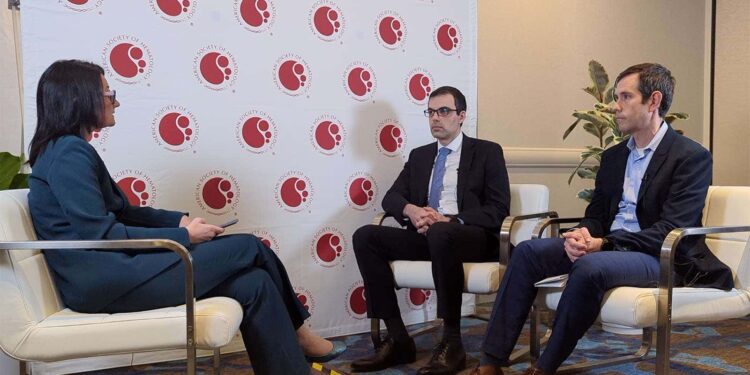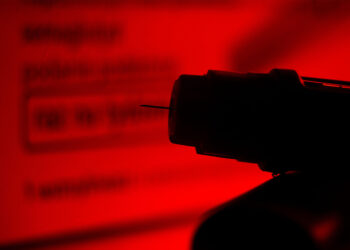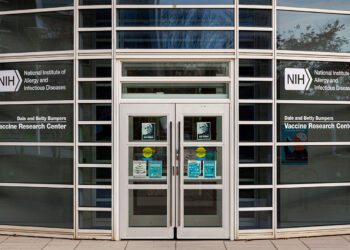At the recent American Society of Hematology annual meeting, early data from the Mithic-FL1 Trial demonstrated impressive response rates with frontline mosunetuzumab (Lunsumio) in high-tumor-bulk follicular lymphoma, positioning the bispecific antibody as a potential alternative to chemotherapy-based regimens.
In this second of four exclusive episodes, MedPage Today brought together three expert leaders in the field, all from the Ohio State University Wexner Medical Center in Columbus: Moderator Kami J. Maddocks, MD, is joined by Yazeed Y. Sawalha, MD, and David A. Bond, MD, for a discussion on the potential of mosunetuzumab as a frontline therapy in follicular lymphoma.
Following is a transcript of their remarks:
Maddocks: We are going to talk a little bit about single agent mosunetuzumab in the newly diagnosed follicular lymphoma patients. Dr. Bond, do you want to give us your thoughts on this abstract?
Bond: Yeah, so really, really exciting data presented by Lorenzo Falchi and colleagues, but it was the Mithic-FL1 study and they were looking at frontline mosunetuzumab for patients with high tumor bulk follicular lymphoma. So a group of patients who are typically treated with chemotherapy-based therapies, but using the bispecific antibody mosunetuzumab as a single agent.
So there were 78 patients. And the regimen has already been studied in relapsed disease, but in the frontline setting had even more impressive results, with a 95% overall response rate as well as an 80% complete response rate. I think the follow-up is still fairly short, but so far there had been very few progression events, and of those there were only seven progressions and almost half of them were due to histologic transformation.
I think it was also interesting that they did see, at least in three patients, loss of CD20 as a mechanism, which could be a mechanism of resistance with progressive disease.
But I think overall, very encouraging results in comparison well with the chemotherapy regimens that we use and with a regimen that in some ways is less toxic.
Maddocks: Yeah, I was going to say, I mean obviously we don’t have the durability and you have to be careful when you’re comparing across trial, but I mean that seems very similar to what we see with frontline chemoimmunotherapy in these higher risk patient populations. Thoughts, Dr. Sawalha?
Sawalha: Yeah, I mean, I agree. These are the typical patient population that we treat with chemoimmunotherapy frontline, so most of them with high disease burden. And the response rate is remarkable, more than 80%. And as you mentioned, we still have to wait and probably for at least a few years they are going to confirm the durability of data. But if we can extend the observation that we saw from the relapsed refractory setting, we can hope that these remissions are going to be durable and hopefully this is a step closer to reaching a point where we’re not giving chemotherapy to most of our patients with follicular lymphoma.
Maddocks: What about the safety in this trial? Was it similar to what’s previously been reported? Was there anything new or different?
Bond: I think the overall safety to me appeared similar to what we expect with the bispecific antibodies as a class, so there wasn’t to me a clear signal of any particularly increased risk of toxicity from the frontline setting.
Maddocks: What do you guys think about moving the bispecific antibodies just kind of in general into the frontline follicular lymphoma? Do you think that’s of high interest, or think single agents of high interest, that patients will need combinations? Any kind of general thoughts on this kind of approach?
Sawalha: I think the data are definitely very encouraging, and I think this class of drugs is one of the most exciting ones to be potentially introduced into the first line. High response rates, if you can manage toxicity during the first month. Other than that, probably the main other concern would be infection, which is unfortunately a concern with most of our treatments because of B-cell depletion. But potentially avoid the significant cytopenias that we sometimes see with chemotherapy and all the other potential chemo-related complications. So I’m personally definitely excited about this class of drugs potentially moving frontline, hopefully.
Bond: I think it’s a class of drugs that’s being looked at in combination as well, that we need more follow-up, but I think the efficacy of the single agent, that may be an attractive option, but I think we will see more data with combination-based therapies.
I think one of the other things that I noticed that I didn’t mention was that one of the concerns has been this potential for a flare reaction with treatment. And it looked like that was only really observed in one patient out of the 78, so it doesn’t appear to be common in the frontline setting, even with these high tumor bulk patients.
Maddocks: And really many follicular lymphoma patients receive their initial therapy in the community setting. I mean, is this is something that you perceive to be easily translated into community practice?
Bond: Yeah, it’s an outpatient regimen. While CRS [cytokine release syndrome] is seen, it’s mostly grade one CRS. I think that it appears to be feasible to give this in the community setting.
Sawalha: Yeah, I agree as well. I mean, most of the CRS events are grade one rather than two or three, and so I think they can be managed. It might take time to improve access for these therapies, but I think it’s doable and I don’t think that’s going to be a major barrier.
Maddocks: Okay, great. Well, thank you for this great discussion on mosunetuzumab in the frontline setting. Thank you.
Source link : https://www.medpagetoday.com/meetingcoverage/ashexpertroundtablefollicularlymphoma/113532
Author :
Publish date : 2024-12-26 14:00:00
Copyright for syndicated content belongs to the linked Source.


![author['full_name']](https://newshealth.biz/wp-content/uploads/2024/12/Frontline-Mosunetuzumab-Shows-High-Response-Rates-in-Follicular-Lymphoma.jpg)












